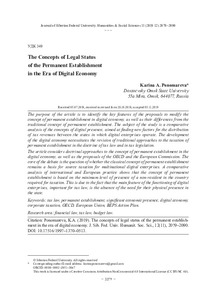The Concepts of Legal Status of the Permanent Establishment in the Era of Digital Economy
Скачать файл:
URI (для ссылок/цитирований):
https://elib.sfu-kras.ru/handle/2311/127053Автор:
Ponomareva, Karina A.
Пономарева, К. А.
Дата:
2019-11Журнал:
Журнал Сибирского федерального университета. Гуманитарные науки. Journal of Siberian Federal University. Humanities & Social Sciences;2019 12 (11)Аннотация:
The purpose of the article is to identify the key features of the proposals to modify the concept of permanent establishment in digital economy, as well as their differences from the traditional concept of permanent establishment. The subject of the study is a comparative analysis of the concepts of digital presence, aimed at finding new factors for the distribution of tax revenues between the states in which digital enterprises operate. The development of the digital economy necessitates the revision of traditional approaches to the taxation of permanent establishment in the doctrine of tax law and in tax legislation.
The article considers doctrinal approaches to the concept of permanent establishment in the digital economy, as well as the proposals of the OECD and the European Commission. The core of the debate is the question of whether the classical concept of permanent establishment remains a basis for source taxation for multinational digital enterprises. A comparative analysis of international and European practice shows that the concept of permanent establishment is based on the minimum level of presence of a non-resident in the country required for taxation. This is due to the fact that the main feature of the functioning of digital enterprises, important for tax law, is the absence of the need for their physical presence in the state Цель статьи — выявление особенностей предложений по модификации концепции постоянного
представительства в условиях цифровой экономики, а также их отличий от традиционной концепции постоянного представительства. Предметом исследования
является сравнительный анализ концепций цифрового присутствия, направленный на поиск новых факторов распределения налоговых доходов между государствами, в которых действуют цифровые предприятия. Развитие цифровой экономики обусловливает
необходимость пересмотра традиционных подходов к налогообложению постоянного представительства в доктрине налогового права и в налоговом законодательстве. В статье рассмотрены доктринальные подходы к концепции постоянного представительства
в условиях цифровой экономики, а также предложения ОЭСР и Европейской комиссии. В основе дискуссии лежит вопрос о том, остается ли классическая концепция
постоянного представительства основанием налогообложения у источника для транснациональных цифровых предприятий. Сравнительный анализ международной и европейской практики показывает, что концепция постоянного представительства основывается на минимальном уровне присутствия нерезидента в стране, необходимом
для налогообложения. Это связано с тем, что основной особенностью функционирования
цифровых предприятий, важной для налогового права, является отсутствие
необходимости их физического присутствия в государстве

